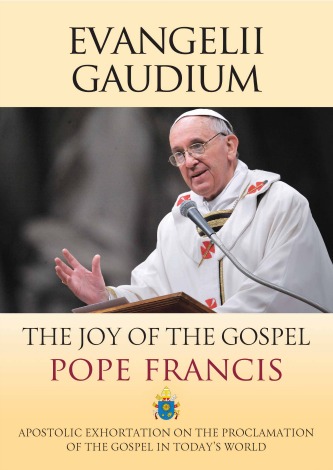 Evangelism and evangelisation are often turn-off words in church conversation. All churches commend the importance of sharing faith with others. But people often identify evangelism with proselytism or spin. And in the Catholic Church evangelisation can be associated with a high rhetoric designed to protect current forms of institutional relationships and practice.
Evangelism and evangelisation are often turn-off words in church conversation. All churches commend the importance of sharing faith with others. But people often identify evangelism with proselytism or spin. And in the Catholic Church evangelisation can be associated with a high rhetoric designed to protect current forms of institutional relationships and practice.
That is a pity because evangelisation focuses on what lies outside, something churches need to do if they are to avoid becoming weary and staid. In his first extended document Evangelii Gaudium Pope Francis offers a welcome fresh take on sharing the Gospel as good news. The document offers no revision of Catholic doctrine and moral teaching; its style and major themes have become familiar in recent months. But its conversational style embodies the kind of change that needs to take place if the Church is effectively to commend the Gospel to others.
The changes commended by the Pope have mainly to do with the Catholic imagination. They involve seeing the heart of the church to lie in the relationships with those outside it. But if those relationships are to be fruitful the governance and priorities of the Church must also change.
For Francis the life of Christians asks them to go out of their comfort zone to communicate God's compassion to those who are on the edges of society and church. To do this they must have experienced God's compassion in their own lives and to have found in it a source of such deep joy that they want to share it with others.
Sharing faith must be characterised by compassion and respect. Its task is not to win a war against the secular world and its philosophies but to win people. So it must include people in conversation and focus on what matters most deeply — the love and compassion of God — and not on the details of faith and moral teaching.
In the Pope's view the highest priority of Church governance is not to preserve faith but to communicate it. So it should be inspired less by the desire to control than by boldness.
The Pope embodies this boldness in his rhetoric. Changes in the Church that were once not open for general discussion are now named bluntly as agenda items. Among them are the decentralisation of Church governance and so inevitable changes in the way the Pope is seen in the universal church.
Francis writes most passionately when he speaks of going out to the poor. They are the centre, although not the sum, of the Church's address. He cuts through tiresome debates about who the poor are: they are the people living in the favelas of Argentina and other cities, and others who share their indigence and precariousness.
Because his interest is in people's concrete lives and relationships, he asks why people are poor. He focuses on the evils of an economic order that holds people in poverty.
The interest of Evangelii Gaudium lies less in a single argument than in the variety and sharpness of its perceptions. It is less like a Penny Bunger than a string of Tom Thumbs. So a few personal reflections.
First, Francis is not interested in radical institutional or doctrinal change but wants to help a dysfunctional Church work better at compassionately communicating God's love. He will remain within the framework of Church teaching on faith and morality he has inherited, including on the reservation of priestly ministry to men and respect for life before birth. But he wants less self-preoccupation in governance and in imagination.
Second, some notable firsts and omissions. To my knowledge this is the first church document that refers to 'sourpusses'. It must be the first lengthy papal document for some time, too, that refers to the Magisterium only twice in passing. Nor does Pope Francis refer explicitly to clerical sexual abuse, one of the greatest current obstacles in Western societies at least to sharing or hearing Catholic proclamation of the Gospel as good news.
Third, the section on the challenges posed by the modern world is a broad brush and earthy presentation of systems and ideologies discussed regularly in church documents — individualism, neoliberalism, consumerism, secularism and so on. I enjoyed especially his strong criticism of the deification of the market. But I wonder whether the easy naming of cultural trends will help the Church to go out to people as the Pope commends. It has led Catholics in the past to judge people who are different as embodiments of an ideology rather than simply as people with the same mixture of high and low desires, bright and dumb ideas, as ourselves.
But finally I was delighted by the way in which Evangelii Gaudium expressed so simply and directly a joy in faith, an insistence that the poor must be at the centre of the Church's imagination and governance, and an impatience at the various ways in which Catholics can encage faith and make it morose.
 Andrew Hamilton is consulting editor of Eureka Street.
Andrew Hamilton is consulting editor of Eureka Street.